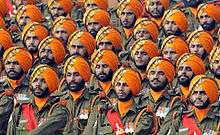Sikhism
Sikhism is a monotheistic, dharmic religion that had its origins in the Indian state of Punjab, where its followers are still largely concentrated. However, with the advent of British rule in India in the 18th century, Sikh communities have also been established in many other parts of the world, particularly where there are large Indian diasporas. With around 25 million adherents, it is the world's fifth largest religion.
Understand

Sikhism was founded in 15th century Punjab by Guru Nanak. Sikhs believe that there is only one god, and the gods of all other religions are simply different manifestations of this single god. Sikhs generally believe that they are required to follow the teachings of the ten gurus, the last one being Guru Gobind Singh. Guru Gobind Singh named Sikhism's holy book, the Guru Granth Sahib, as his successor before his death, thus ending the line of human gurus, and making the scripture the eternal authority on the religion.
Sikhs reject the traditional Hindu caste system in theory (though not necessarily in practice). As part of this philosophy of rejecting social classes, all male Sikhs are required to have the surname Singh, while all female Sikhs are required to have the surname Kaur, as differing surnames have traditionally been seen by Sikhs as an indication of social class. Sikhs are forbidden from cutting their hair, and are also required to cover their hair in public. Male Sikhs traditionally wear a turban (or Dastaar is Punjabi) for this purpose, while female Sikhs traditionally wear a headscarf known as a Chunni (similar but not identical to the Muslim hijab), though an increasing number of Sikh women are opting for the male turban instead.
All Sikhs are required to wear five items at all times as articles of their faith, which are also known as The Five Ks; Kesh (uncut hair), Kangha (wooden comb), Kara (iron bracelet), Kachera (tieable cotton underwear) and Kirpan (iron dagger). The use of the Kirpan is strictly limited to self defence and the protection of others, and Skihs are mandated by their religion to provide assistance to the victims and not turn a blind eye whenever they encounter crimes being committed.
Sikhs have a reputation of being fierce warriors, and contributed significantly to the Allied war efforts in both world wars as part of the British Indian Army's Sikh Regiment. Today, the Sikh Regiment remains the most decorated regiment in the Indian Army.
Festivals
- Baisakhi, which falls on 13 or 14 April (same day as the Hindu Vaisakhi), is the Sikh new year, and the most important festival for Sikhs. It also marks the initiation of the Khalsa, or Sikh warriors, by the final guru, Guru Gobind Singh.
Talk
Sikhism's principal religious text, the Guru Granth Sahib, is written in a number of languages and dialects, including Punjabi, Sanskrit, Persian, Khadi Boli Hindi, Braj Bhasha, Arabic, Sindhi, Rajasthani and Awadhi. This vast combination of tongues was commonly used among all religious figures in Northern India at the time and is collectively known as Sant Bhasha ("saint language"). Due to the fact that the vast majority of Sikhs are either from Punjab, or of Punjabi descent, the Punjabi language is widely spoken among Sikh communities. Depending on where they are established, Sikhs usually also speak the local languages. For instance, it is common for Sikhs living in India to also speak Hindi, or those living in Malaysia to also speak Malay, with the better educated ones usually able to speak English as well.
Destinations
India
.jpg)
- 🌍 Amritsar. Home to the Harmandir Sahib, also known as the "Golden Temple", the holiest site in the world for Sikhs.
- 🌍 Anandpur Sahib. The city where the last two Sikh gurus lived and where Guru Gobind Singh founded the Khalsa army in 1699.
- 🌍 Nanded. Guru Gobind Singh travelled to Nanded and proclaimed he would be the last of the human gurus, making Nanded his permanent abode and establishing the holy book Guru Granth Sahib as the eternal living guru.
- 🌍 Patna. The capital of Bihar houses one of the five Takhats (Sikh seats of authority) and was the birthplace of the tenth and final guru, Gobind Singh.
Pakistan
- 🌍 Nankana Sahib. The birthplace of the first Sikh guru, Guru Nanak.
- 🌍 Kartarpur. Location of the Gurdwara Darbar Sahib Kartarpur, where Guru Nanak is believed to have settled and died after finishing his missionary work. According to legend, Guru Nanak's body was said to have mysteriously disappeared after his death.
- 🌍 Lahore. Location of the Gurdwara Dera Sahib, where Guru Arjan, the fifth guru, is believed to have been martyred.
Eat
There are no strict dietary restrictions for Sikhs per se, but they are forbidden from eating meat from animals that have been subject to ritual slaughter or slaughter methods resulting in a slow death. This effectively means that Sikhs are not allowed to consume halal or kosher meat. As Sikh temples are required to be welcoming to people of all faiths when serving community meals, only vegetarian food is served at such events.
Drink
Sikhs are forbidden from consuming non-medicinal drugs or alcohol, and are also forbidden from smoking. In practice, drinking alcohol is tolerated among much of the Sikh community but smoking or consuming any form of tobacco is a much stronger taboo. Sikhs found to be smoking are often shunned by the community.
Respect
When visiting a gurudwara (a Sikh place of worship), you will be required to take off your shoes before entry. If you are not wearing a turban or chunni, you will also need to wear a rumaal, a piece of clothing similar to a bandana or handkerchief. Free temporary rumaals are provided outside most gurudwaras.